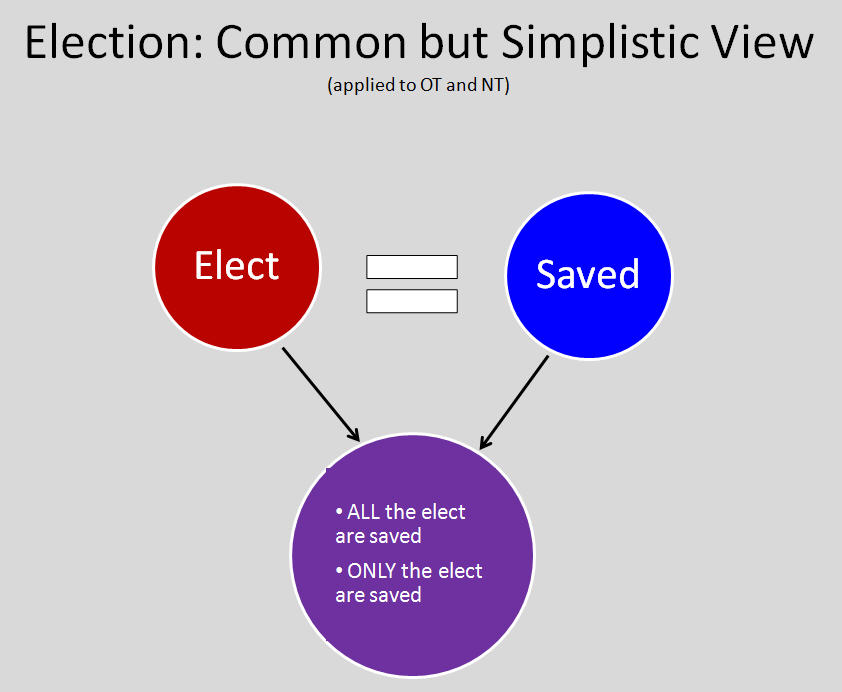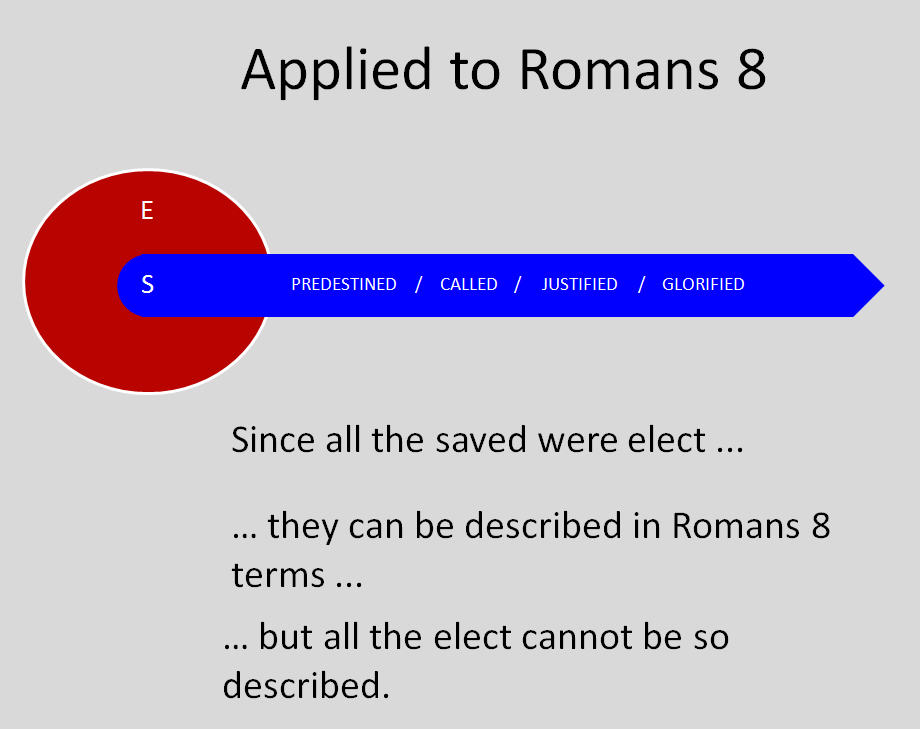Well, I’m finally over oral surgery, the holidays, and the beating I received this past weekend in the Naked Bible fantasy football league. (And that hurt more than the surgery). Time to get back to election.
As indicated in my previous posts on this, I think the common view of election doesn’t work. By common view, I mean this:

Why don’t I think that elect = saved? Because equating the elect and the saved leads to biblical incoherent statements. For example:
1. The nation of Israel was elected (chosen) by God (Deut. 4:37; 7:6-7) … and this election refers to the people born in the line of Abraham to create Yahwehs people … but all (most?) Israelites were not saved; i.e., they were not followers of Yahweh (cf. the exile). This leads to logical questions:
- If these apostate Israelites were elect, how could they not be saved?
- How could Gods election fail?
2. Consider (Romans 9-11) that the reversal of Israels election to non-election status. This reversal was designed to enable Gentile salvation. It was settled before foundation of the world (Eph 1:4). Therefore, Israels national election cannot have meant salvation, since for God’s plan for the Gentiles to be coherent and work, many Israelites had to not be saved (though they were elect).
3. Non-elect people (Gentiles) could convert (and so their non-elect status did not mean they were beyond salvation). That leads to thoughts and realizations like:
- The salvation of the non-elect Gentile was predestined before the foundation of the world (Eph 1:4)
- So if the terms elect and saved are synonyms, God predestined that the destiny of each, made in real time in the day of Abraham, would be reversed, at least in part, later on.
I hope you get the picture. Now for my solution. It’s actually pretty simple, and not novel. I’m just going where the evidence pushes me. Election and salvation must be distinct, but related, things:

Here’s my proposal in diagram:

What this diagram says:
- Everyone saved was elect …
- but not all the elect are saved.
- There is a remnant WITHIN the elect.
- The remnant is not synonymous with the elect
Now for some ramifications — especially factoring in the non-elect. This proposal means:
- There are elect who will be saved.
- There are elect and non-elect who will not be saved (because elect is not a synonym for saved).
- There are also non-elect who will be saved.
This last thought should not sound strange since the non-elect = Gentiles and many of them were and are being saved.
So what was the meaning of election, then? What I say here will logically be akin to what I said about the real meaning of baptism (for those who remember that far back):
Election meant simply that Israel alone had direct access to the true God and his true worship. Israel was privileged by the following:
- Revelation
- Worship
- Given the most direct path to redemption
- Made the conduit of that redemption for all
- Had to choose the obedience of faith to benefit from that access
I would further suggest that when Paul uses “election” terminology he has this view of election in mind — and that does not interfere with what he says in Romans 8. Here is how I’d diagram that:

Go ahead — try out this view when reading Romans 9-11. And while you’re doing that, read closely for comments about unbelief and apostasy. This discussion must include the book of Hebrews as I noted earlier, and it inevitably gets into “eternal security” (whatever that means — and yes, I’ll give you my take on that next time).





My mind feels like mashed potatoes right now , but if I understand correctly Election is not required for Salvation and Salvation is not required for election . So there will be some saved (elect) and some saved (non elect) . There will also be unsaved (elect) and unsaved (non elect) .
I’ll answer this by saying:
A non-elect Gentile could be saved, though non-elect. In the OT that person had to join the elect community to worship, but not to be saved (consider Naaman, the leper and Syrian captain — he certainly believed in Yahweh, even taking holy ground back with him to Syria, but never joined Israel). The norm for Gentile (non-elect) conversion was to join the elect community — but of course many in that community were not really believers (witness the exile and its associated apostasy).
So if the unsaved are set aside and the focus is just on the saved; it’s a matter of God choosing the saved to worship Him and not choosing who will be saved so that they may worship Him .
I can’t say I agree with (or feel I am following) any of your phrasing, so I can’t really answer this.
First sentence: “So if the unsaved are set aside and the focus is just on the saved”
* what is meant by “set aside”? “focus”?
Second sentence: “its a matter of God choosing the saved to worship Him and not choosing who will be saved so that they may worship Him.”
* one does not need to be saved to worship God. This is certainly true today (we are not dependent on a ritual cult for worship; it is the heart) and I’d argue could also be true in the OT and NT. OT: we might not think Nebuchadnezzar became a believer when he acknowledge Yahweh as God of gods, but that was certainly a worship utterance. NT: God-fearing Jews who had not yet heard about Jesus and the cross are said to be worshipping Yahweh.
I think I may still be parsing this as election = salvation and thinking that worshipping God is only to the benefit or privilege of the saved .
Bravo, clear as a bell, logically and biblically cogent.
There are not enough Diagrams used in the Naked Bible lol.
okay, a vote for diagrams!
I also vote for more diagrams! I have been struggling with the predestination issue for over ten years now, and drew the elect / saved diagram on my wall to help me work through it. I’m still working through this issue, but your resources here have been the best that I’ve found to help bring resolution to my heart on this.
you’re welcome!
Ok some further consideration i can see that election does not always have salvation in view it could just be election is to be part of Gods plan (Israel).
I think the major problem with this topic is the term election is being used equivocally, i dont think it follows when talking of election in salvation term to say the non elect are being saved. If the elect are being elected to salvation then the non-elect Cannot be saved logically.
I agree with what your saying, it just seems there is a lot of room for mistakes/misunderstandings if the term is not defined as it can mean more than one thing.
good – so let’s work on terminology. Ultimately, anyone who believes is “finally or eschatologically” elect. But before it’s all said and done, not all the elect are saved.
Maybe my reply to another commenter will help us think about more terms:
>>>
A non-elect Gentile could be saved, though non-elect. In the OT that person had to join the elect community to worship, but not to be saved (consider Naaman, the leper and Syrian captain he certainly believed in Yahweh, even taking holy ground back with him to Syria, but never joined Israel). The norm for Gentile (non-elect) conversion was to join the elect community but of course many in that community were not really believers (witness the exile and its associated apostasy).
I’m not clear about part of your statement in point #2 above…”…since for Gods plan for the Gentiles to be coherent and work, many Israelites had to not be saved (though they were elect).”
I am beginning to understand the difference between elect and saved and what conditions these words describe. But was it really necessary for “many Israelites” to not be saved in order for Gentiles to be saved? Are the two results dependent on one another? If every “elect” Israelite became “saved” would God not have extended His grace to the Gentiles? Or is the thought that because many elect chose not to be saved, that God extended His grace to the Gentiles? Or am I reading something into your statement that isn’t there?
I’m paraphrasing Paul’s own language in Romans 9-11. Read that again (and again!) carefully. That is Paul’s rationale for what happened to Israel and how the Gentiles were grafted in as believers. Paul elsewhere calls this a “mystery” (musterion). No kidding, Paul.
Dr. Heiser, I believe I understand your proposal here, but I’d like to offer a few more thoughts. Your replies are, of course, much appreciated.
Your inequality between Elect and Saved is quite true and in agreement with a point I made by way of a question I proposed in the “The Election of Israel and Its Meaning, Part 1” post, namely, elect as to what? It is quite possible, and could be demonstrated without too much difficulty, that a person or group could be elect for non-salvific purposes. Cyrus would be an apt example (Isa 45). Moreover we must be careful to not assume election requires predestination/foreknowledge; it may or may not. It was the non-salvific nature of some election that motivated me to begin my response to your post by defining what “elect” meant, pointing out that it simply means selected from an array of options, and further stating that the “concepts of salvation and predestination/foreknowledge may or may not be present.”
I have some trouble, however, with your second diagram wherein all Saved are Elect but not all Elect are Saved. My discomfort springs from my sense (perhaps incorrect) that for you “Saved” means spiritually saved. As I pointed out in my response in the “The Election of Israel and Its Meaning, Part 1” post, “Saved”/”Salvation”/”Deliverance” has at least two senses, spiritual and physical, to which we could even add eternal and temporal. If, as I assert, Israel was elect as a body (not every Israelite being elect in his own person) then elect Israel had to be save/delivered from its enemies until the purpose of its election had been completed, whatever that may be. So, your second diagram is not correct, in my opinion, unless you make it explicit that “Saved” = “Spiritually Saved” and “Elect” = “Elect to Spiritual Salvation”. (No doubt you can sniff the scent of Eternal Security here, too.)
I also have some difficulty with some statements under that second diagram. For example, “There are also non-elect who will be saved,” which you further explain by stating, “This last thought should not sound strange since the non-elect = Gentiles and many of them were and are being saved.” I believe this is incorrect for the following reasons. Jesus plainly said, “No man can come to me, except the Father that sent me draw him… no man can come unto me, except it be given unto him of the Father” (John 6:44, 65). Notice that it is not that no man comes to Jesus except the Father draw him, but rather that no man can come to Jesus without the Father’s prior action dragging (as the verb forcefully means) him. So, Israelite or Gentile, God first chooses–elects–that individual to be drawn to Christ, in whose name only is spiritual salvation possible (Acts 4:12). So then, every Gentile who was/is being saved was elect of God. Paul speaks to this in Eph 2:1-13, earlier having declared that all believers were chosen him before the foundation of the world (Eph 1:4). Again, your statement begs the question, elect as to what?
The last diagram I do agree with, providing we again understand that the Saved are the Spiritually Saved and the Elect are those elect for spiritual salvation, not merely some mundane purpose.
In essence, all of what you wrote requires, in my mind, a constant awareness of the distinctions in “Elect” and “Saved” with respect to the understand of those terms as I briefly outlined at the beginning of my response in the “The Election of Israel and Its Meaning, Part 1” post.
Yes, the Keilah incident is very important. Way back, almost two years ago when I started this blog, I tried to convince readers that foreknowledge does not necessitate predestination, based on the Keilah event (God foreknew events that never happened, so they could not have been predestinated to happen). That produced my summary back then:
God foreknows all events, whether they happen or not.
God’s foreknowledge does not necessitate predestination (since some foreknown events do not happen).
So, what about events that DO happen – are they all predestinated? Answer: maybe or maybe not. Since there is no necessary linkage between foreknowledge and predestination, all we can say for sure is that God *could* have predestinated events that do happen (and I’m sure he does, based on other passages), but we cannot say that an event that happens was decreed by God to happen – only that he foreknew it. To go further than that is to BIND foreknowledge and predestination in a way that the Keilah incident tells us is not the case.
This view puts me at odds with both the staunch calvinist and the open theist (in the case of the latter, to me it does not follow that God can be truly surprised, since he knows everything that does and can happen).
I think all humans are given “a” choice to believe in (a correct response) certain revelation given to them. That may or may not be the full gospel. I use OT salvation as an analogy here. OT believers knew nothing of Christ or the cross (we don’t even get the [somewhat clear] idea of a suffering messiah until the 8th century BC or later, depending on your view of when Isaiah 53 was written. But Yahweh did communicate to people that he was the God of gods and he wanted relationship. As Paul says in Romans 10:18 (quoting Psalm 19) all humans did hear some sort of “salvation relationship message” in the stars. I have my own view of what Paul was thinking there, and it wasn’t the full blown gospel.
At any rate, a positive response to whatever revelation God gives is sufficient for the salvation of that person IN THE EYES OF THE GIVER (God). I don’t claim to know how God processes the response, but it is evident that he does accept faith in him even when that is not articulated in full terms of the gospel as we know know it).
Looks like the general theme of the comment share the problem of equivocation when it comes to the term “elect”.
It seems when writing about election the writer has to be clear about what the subjects are being elected to, hopefully this will avoid any crossovers. The default meaning of election held by Joe Public is connected to salvation and this causes problems when the salvation is not in mind and not defined. But i think it cleared up now.
Looking forward to read what you have to say about Hebrew 6 and the terminology “before the foundation of the world”
Timely and coherent.
I will post more detail on this later – my long-term thoughts are in keeping with Michael’s summary:
1. The pivotal narrative of the Bible for Jews and Christians is the Exodus. One who reads the entire script carefully might [as I muse] come to the conclusion in fact that “Election” is a Contrary Indicator to “success” in gaining the blessings of the Covenant [salvation]!! Israel was not only Chosen but prophesied-to by none other than YHWH Himself that his Will was to march them right out of Egypt and into the Promised Land – not a future generation but THAT generation whom he called out and led by miraculous effort. Despite being Called, Chosen, Prophesied-of, Promised, Led of the Spirit by Fire and Cloud, and shepherded by the great Prophet Moses, the blew it through their own deeds. Their rebellion was counted as “non-faith” [Hebrews] and their blessing was lost – they died in the wilderness.
2. The large circle of Election has support in the universalism texts of the NT: The “grace of God has appeared bringing salvation to ALL men…” Titus 2:11 and other such verses I’m sure we will cover at length.
Tension: Jesus warned that a time would come when, were it not for an interventional act of the Father “even the Elect would be deceived” [IIThess 2] – The Elect cannot afford to sleep, and Paul specifically warned the “graftees” that their election can be thwarted.
I enjoy this blog and the posts tremendously unassuming, non-conforming and unconventional, disregarding popular dogmas if not aligned with the Scripture.
Your proposal seems logical and coherent once elect is clearly defined.
Election does not equal eternal (spiritual) salvation neither is a guaranty of it – that is quite clear from the Scripture.
Election seems to be a calling (choosing) for a special purpose and is not restricted to Israel only.
Sure enough Israel was the only nation chosen by God and unique (elect) in that sense, but God also called (elected) individuals from non-elect (oxymoron?) nations, and I believe He still does it even today (until the fullness of the Gentiles )
Election has to do with predestination but not in the conventionally accepted sense. Predestination determines the time of Gods calling to His eternal truth Gods offer to accept eternal salvation. There is an order in Gods plan. Everyone eventually will be given a chance one way or another. God is not a respecter of persons. After all Christ died for the sins of the whole world and Gods desire is for all to be saved.
I dont see in the scripture predestination or absolute determination for anyone to be saved or lost eternally. That would totally negate a free will.
Thanks – I will try and hit on predestination as well. Next post will be about the Hebrews situation.
I want to make sure I get this on the table early. I challenge the notion that “elect” as rendered in English in the Gospel writings means “Jewish follower of Christ”. As anyone knows, Jews may be Jews indeed in the NT, or may be a “synagogue of Satan”, “snakes”, “Brood of Vipers” or “not all Jews”. Jesus’s ‘Elect’ seems to be equivalent to “My Followers” – those who abide in Him.
Doc Heiser: does a sheer language drilldown on the terms rendered “Elect” in Greek/Aramaic/Hebrew illuminate anything germane to the issues?
The terms are the same terms used in generic choice-making. Nothing special.
I think you miss something in your analysis, namely that the House of Israel and the House of Judah were two different entities, and you presuppose that ????? (ethnos G1484) carries the correct meaning in English (and why do you capitalize gentiles for heavens sake?).
Why does it matter?
Paul understood that the House of Israel and the House of Judah would be united by the messiah [Eze 37] and [Jer 31:31], and could have been speaking to the House of Judah (the stay-at-home son) about the House of Israel (the heathenised prodigal son) rather than non-Israelies.
This cannot be seen if one doesn’t see past the presupposition that ????? translates correctly to ‘Gentiles’. (You seem to be linguistically careful with other things, I’m not sure why you accept this one unconditionally.)
The election language of Deuteronomy is prior to Israel and Judah as separate entities (at least in the received canonical text). The point is the election language directed at all the tribes.
Don’t get me wrong, I agree with your insight election doesn’t mean salvation, and that election is ultimately about Israel. I just think talk of ‘Gentiles’ (whatever the talk), is unfounded theology.
so all nations are elect / Jewish? What term would you prefer?
I missed your response last year. Sorry. If you ever post on the Abrahamic promise, Ill answer you there ….
For some reason this question cuts off, so it’s incomplete.